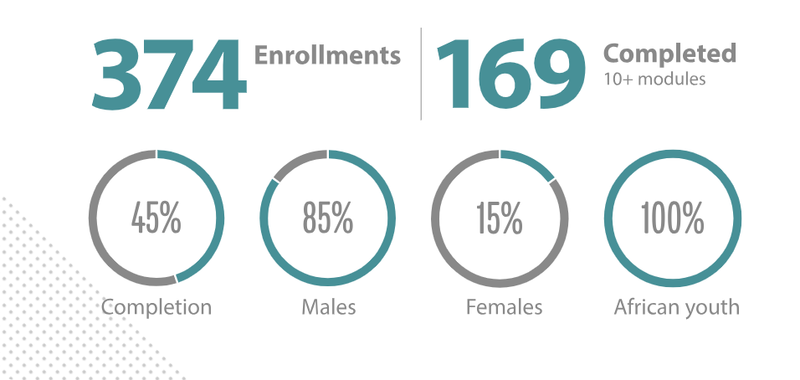Despite the increasing availability of data and a growing appreciation for the importance of data-driven product design, there is a practical disconnect between the decisions being made for financial inclusion in Africa and the available data. This gap hinders the extent to which financial products and services meet the needs of excluded and underserved people.
With data science still emerging as a career path for young Africans, a shortage of data science human capital is a key contributor to the disconnect. As financial institutions begin to recognise the power of data and the need to employ a greater level of data analytics in the design of product innovations, capable African data scientists are required to meet this demand.
The DataHack4FI initiative seeks to contribute to data science skills development and the empowerment of African youths in a field that is increasingly providing opportunities for career advancement. However, aspiring African data scientists face numerous challenges as they pursue a career in data science. The perception among data fellows from DataHack4FI Season 2 is that career opportunities are currently limited but are becoming available as the general understanding of data science improves. The overarching theme is one of a growing data science landscape in Africa.
“The opportunities are there. Every organisation talks about data science and the need to build a data science team; but the expectations, the structures, the environment for data science to work is not yet mature enough.” – Dickson from Uganda
A key obstacle to the emergence of data science jobs in Africa is a lack of institutional culture around the importance of data science. Some organisations simply do not understand the power of data and the role that data science can play in a business. Although the job market is not yet fully responsive to data science, opportunities are being created as institutions become increasingly data-centric.
“The opportunities are still limited and basic. Many companies are still not willing to give out their data unless they understand the value of data science. At the moment, data science is a trial operation.” – Khadija from Tanzania
In instances where data science jobs are available, there is frequently a practical disconnect between managerial expectations and the roles/responsibilities that data scientists expect to fulfil within an organisation. This unwillingness to depart from traditional business methods stems from a fundamental lack of data science understanding, where organisations do not view data science as a business priority but rather as a value-add to established internal operations.
“You’ll find that most data scientists in the market right now are actually pretty frustrated because they went into their company with a certain mind-set: I’m going to solve problems. There is a very big disconnect between what the management thinks a data scientist will do and what a data scientist is actually supposed to do.” – John from Kenya
Organisations that are looking to enhance their use of data and invest in internal data science capacity face a shortage of capable African data scientists. Businesses frequently resort to hiring data science consultants from outside the country, if not outside the continent, due to the scarcity of competent local resources. A lack of formal educational opportunities is a key contributor to the shortage of proficient data scientists on the continent. As a result, aspiring data scientists are required to access costly online resources or are forced to pursue informal education pathways to develop their theoretical knowledge and practical experience. This further limits career prospects as employment opportunities are more readily available to those with formal qualifications, rather than individuals who are self-taught.
“Part of the problem is a lack of education opportunities. I think there’s one institution embracing it, but still it is not enough. I think there’s room for online training to provide that skill to individuals.” – Brian from Uganda
“I was looking to do a Master’s in data analytics or business intelligence, but there are no degrees available. I was unable to find any institutions in Zambia offering such courses.” – David from Zambia
“You need to have high-level education and lots of experience to find a data science job. If you want data science coursework, you need to look online.” – Patricia from Tanzania
DataHack4FI Season 3 is supporting digital skills development for African youths, and by partnering with Microsoft and Liquid Telecom, 169 aspiring data scientists from seven African countries are currently working towards completing the Microsoft Professional Program in Data Science, an internationally accredited certification valued at USD999. The top-performing candidates from each DataHack4FI focus country will then be paired with an emerging technology company to collaborate in the design of innovative solutions to financial and economic-inclusion-related business challenges. Therefore, the DataHack4FI initiative is driving digital skills development and is creating employment opportunities for young Africans, while impacting financial and economic inclusion through the design and release of data-driven products and services that meet the needs of Africans.

DataHack4FI Season 3 was launched in November 2018 and will culminate at the Grand Finale, held in Rwanda, in August 2019. Held in seven countries (Ghana, Kenya, Nigeria, Rwanda, South Africa, Uganda and Zambia), the competition serves as a platform for participating teams to showcase their work to potential investors and partners, while vying for the DataHack4FI title and USD25,000 in seed capital.
For more information visit www.datahack4fi.org.
As the data science landscape in Africa matures, where organisations and institutions are gradually realising the value of adopting evidence-based business practices, there is a clear need for capable African data scientists who understand the context in which business challenges will need to be solved. By driving data science skills development and data-driven thinking throughout Africa, the DataHack4FI innovation competition is enabling the design of African solutions to African problems.
